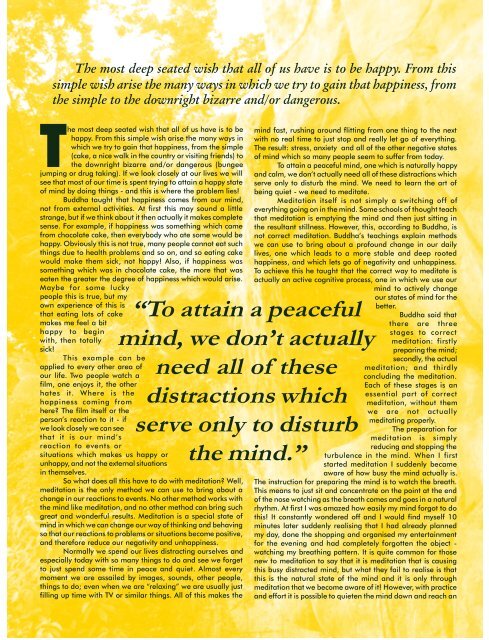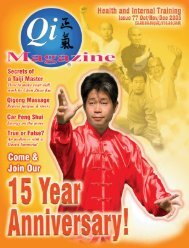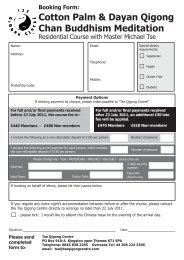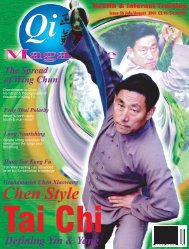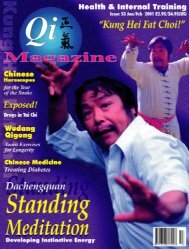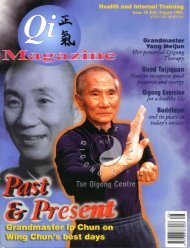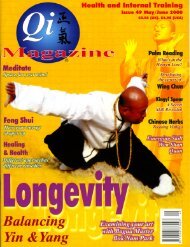Issue 54 - Tse Qigong Centre
Issue 54 - Tse Qigong Centre
Issue 54 - Tse Qigong Centre
- No tags were found...
Create successful ePaper yourself
Turn your PDF publications into a flip-book with our unique Google optimized e-Paper software.
The most deep seated wish that all of us have is to be happy. From thissimple wish arise the many ways in which we try to gain that happiness, fromthe simple to the downright bizarre and/or dangerous.The most deep seated wish that all of us have is to behappy. From this simple wish arise the many ways inwhich we try to gain that happiness, from the simple(cake, a nice walk in the country or visiting friends) tothe downright bizarre and/or dangerous (bungeejumping or drug taking). If we look closely at our lives we willsee that most of our time is spent trying to attain a happy stateof mind by doing things - and this is where the problem lies!Buddha taught that happiness comes from our mind,not from external activities. At first this may sound a littlestrange, but if we think about it then actually it makes completesense. For example, if happiness was something which camefrom chocolate cake, then everybody who ate some would behappy. Obviously this is not true, many people cannot eat suchthings due to health problems and so on, and so eating cakewould make them sick, not happy! Also, if happiness wassomething which was in chocolate cake, the more that waseaten the greater the degree of happiness which would arise.Maybe for some luckypeople this is true, but myown experience of this isthat eating lots of cakemakes me feel a bithappy to beginwith, then totallysick!This example can beapplied to every other area ofour life. Two people watch afilm, one enjoys it, the otherhates it. Where is thehappiness coming fromhere? The film itself or theperson’s reaction to it - ifwe look closely we can seethat it is our mind’sreaction to events orsituations which makes us happy orunhappy, and not the external situationsin themselves.So what does all this have to do with meditation? Well,meditation is the only method we can use to bring about achange in our reactions to events. No other method works withthe mind like meditation, and no other method can bring suchgreat and wonderful results. Meditation is a special state ofmind in which we can change our way of thinking and behavingso that our reactions to problems or situations become positive,and therefore reduce our negativity and unhappiness.Normally we spend our lives distracting ourselves andespecially today with so many things to do and see we forgetto just spend some time in peace and quiet. Almost everymoment we are assailed by images, sounds, other people,things to do; even when we are “relaxing” we are usually justfilling up time with TV or similar things. All of this makes themind fast, rushing around flitting from one thing to the nextwith no real time to just stop and really let go of everything.The result: stress, anxiety and all of the other negative statesof mind which so many people seem to suffer from today.To attain a peaceful mind, one which is naturally happyand calm, we don’t actually need all of these distractions whichserve only to disturb the mind. We need to learn the art ofbeing quiet - we need to meditate.Meditation itself is not simply a switching off ofeverything going on in the mind. Some schools of thought teachthat meditation is emptying the mind and then just sitting inthe resultant stillness. However, this, according to Buddha, isnot correct meditation. Buddha’s teachings explain methodswe can use to bring about a profound change in our dailylives, one which leads to a more stable and deep rootedhappiness, and which lets go of negativity and unhappiness.To achieve this he taught that the correct way to meditate isactually an active cognitive process, one in which we use ourmind to actively changeour states of mind for thebetter.“To attain a peacefulmind, we don’t actuallyneed all of thesedistractions whichserve only to disturbthe mind.”Buddha said thatthere are threestages to correctmeditation: firstlypreparing the mind;secondly, the actualmeditation; and thirdlyconcluding the meditation.Each of these stages is anessential part of correctmeditation, without themwe are not actuallymeditating properly.The preparation formeditation is simplyreducing and stopping theturbulence in the mind. When I firststarted meditation I suddenly becameaware of how busy the mind actually is.The instruction for preparing the mind is to watch the breath.This means to just sit and concentrate on the point at the endof the nose watching as the breath comes and goes in a naturalrhythm. At first I was amazed how easily my mind forgot to dothis! It constantly wondered off and I would find myself 10minutes later suddenly realising that I had already plannedmy day, done the shopping and organised my entertainmentfor the evening and had completely forgotten the object -watching my breathing pattern. It is quite common for thosenew to meditation to say that it is meditation that is causingthis busy distracted mind, but what they fail to realise is thatthis is the natural state of the mind and it is only throughmeditation that we become aware of it! However, with practiceand effort it is possible to quieten the mind down and reach anQi Magazine 19


